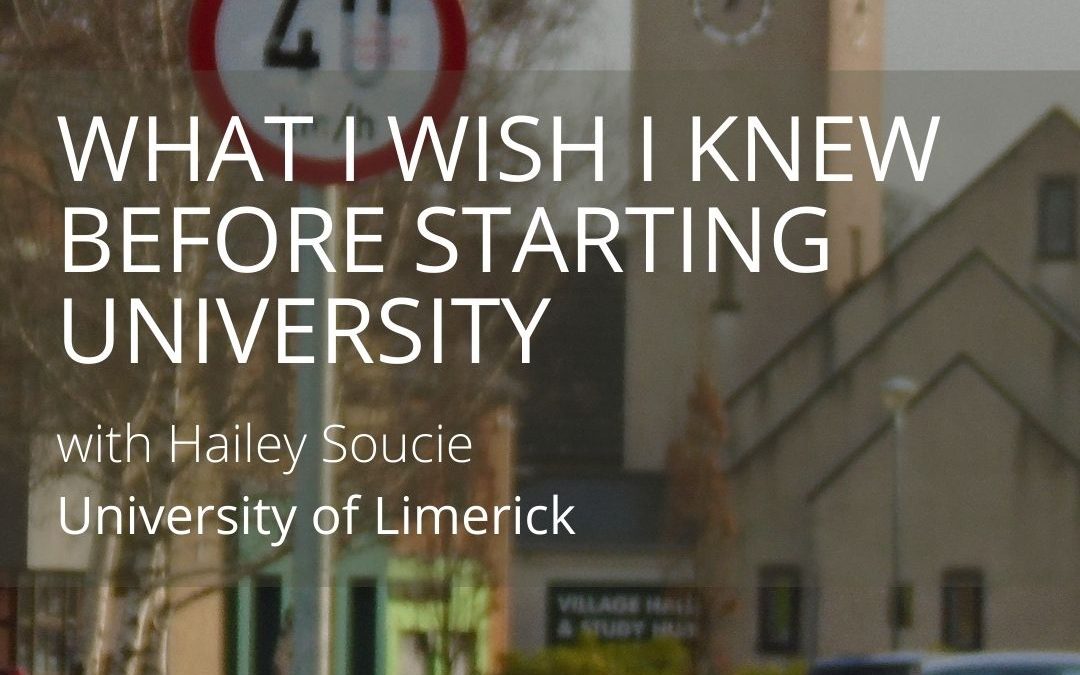Student Ambassador Hailey Soucie shares her honest take on what it’s really like to start a semester abroad at the University of Limerick. From housing and transport to campus culture, she’s got tips every international student should know.
If I were to have a do-over of my first semester of university abroad, there’s not much I would change. However, there are a few things I wish I’d known ahead of time. There is much comfort in feeling in control, knowledgeable, and confident when it comes to college. Unfortunately, I didn’t feel all of those things until the end of my first semester, as there were numerous absences and gaps in my knowledge. Fortunately for you (the reader), I have some advice that I wish I’d received much earlier.
My parents are the type who must know what is happening, when, where, and who is involved at all times. Sending their first child across the world was no easy feat. In an effort to avoid a broad generalisation of all Irish universities, I will narrow it down to my institution, the University of Limerick (in Limerick, Ireland). They do things in a very different way (a mix of positive and negative) compared with any university in my home country (the United States).
1. Urgency and Preparedness
In my experience, the biggest education-based divide is the sense of urgency in the provision of information. For my family, this was incredibly nerve-racking. Stateside, your semester’s schedule is given (typically) at least one month before the start of your semester. At UL, our lecture schedule is given no more than two weeks before classes begin. The rest of your classes (tutorials and labs) are often allocated after the first week of lectures. There is very little room for becoming comfortable with a schedule before the semester starts, for better or worse.
Another cultural divide is the minimal communication regarding accommodation and housemates. In March, I received notice that I had secured my preferred ‘village’, and I quickly paid the deposit. However, the only communications after that were purely to notify us of payment dates. I was not able to find out who my housemates were or what house I was in until the day I received my keys. Coming from a college culture where it was common to meet your roommate(s) before the semester starts, entering a house where I knew none of my five flatmates was a major shock.
Overall, none of this was particularly negative, but there was definitely an element of unpreparedness for that culture shock on my part. If you are coming from a culture similar to the US (preparedness and early information), be aware that your information can and may come much later than you anticipate. Still, have confidence that everything will work out. Even with my family’s stress and big feelings of underpreparedness, we all became more comfortable with my situation in time. Be patient, but never hesitate to reach out for help.
2. Accommodation 
Something to be aware of is the limited accommodation available on most Irish campuses. With the massive population influx and the rising prices of land and building, universities cannot keep up with demand. If you intend to live on campus, you must take the initiative and secure your place in the ‘lottery’ system as soon as possible. For UL, the housing lottery opens in March or April and they quickly let you know whether or not you’ve secured accommodation.
If you are coming from far away, this is possibly the second most important step to attending an Irish university (second only to gaining admission). Be aware that accommodation is a pricey endeavour. In preparation, try to save up anywhere from €2,000–€6,000 per semester (depending on the location of your university). Do not delay in arranging accommodation, as finding off-campus options is time-consuming and requires adequate time to view properties and sign your lease.
3. Public Transport 
This is easily the most accessible form of transportation around your city and the country. There are plenty of bus routes and services running at many hours of the day, so definitely take advantage of them. However (Irish locals will agree), you must expect delays or irregular arrival times. When travelling to Dublin from many western cities, you must allow around 30–45 minutes (on top of the bus ride) for stops, delays, and weather. Do not anticipate perfection, as it tends to be unlikely.
Getting a LEAP card is a necessity if you don’t have a car or bicycle. Fares are cheaper for university students, and this allows you to have full access to the city more quickly than walking or cycling. Ask your university if they offer LEAP printing services on campus, as this will allow you to quickly receive your card.
4. ‘Overtime’
Between students and lecturers, when the class ends, it ends. All but one lecture I have attended has ended early or right on time. Similarly, campus services will strictly adhere to their opening hours, and these often vary. Be aware of opening hours and make use of your services while they last.
For students, some campus offices have varying opening hours that are at somewhat irregular or illogical times. Always check, and be aware that even your accommodation reception will not always be open. This was a major culture shock for me, as I was used to near 24-hour service in accommodation receptions and a consistent 9:00–17:00 opening time for school services. While not inherently negative, it was definitely unexpected.
Overall, regardless of where you end up for college, there will be a fair amount of difference between your expectations and reality. These will be a mix of positive and negative, but overall, patience and communication will strongly aid your journey towards comfort.
Hailey Soucie is studying at University of Limerick via Education in Ireland.

